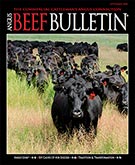Tips to Reduce and
Handle Heat Stress in Livestock
Heat stress compromises animal health and performance.
Warmer temperatures are quickly approaching, and that means livestock producers should start considering how to help their animals handle the heat. Heat stress is almost inevitable, but some management practices can be implemented to help animals better cope with rising temperatures.
All mammals regulate their internal body temperature involuntarily. Heat stress occurs when the animal’s ability to self-regulate and lower core body temperature is overwhelmed and the animal’s performance and/or health is compromised.
Signs of heat stress include:
- bunching in the shade,
- salivating excessively,
- foaming around the mouth,
- panting, and
- trembling or lack of coordination.
Effects of heat stress include:
- reduced feed intake and weight gain,
- poor breeding efficiency,
- lower milk production,
- increased disease susceptibility, and
- death in severe cases.
Being proactive is the best approach to helping animals deal with heat stress. Having a solid management plan in place to combat heat stress could play a crucial role in an operation’s ability to maintain animal performance during periods of increased heat. Some management options include:
- Shade: Temperature can be lowered by providing areas where animals can get out of direct sunlight.
- Improved ventilation: Providing fans or allowing for adequate air movement helps alleviate heat stress.
- Clean, cool drinking water: Water is necessary to keep the animal’s body temperature within normal limits. Providing cool water will also help cool the animal’s core.
- Wetting: Gradually wetting an animal with cool water from sprinklers or hoses is an effective way to cool an animal suffering from heat stress. Wetting the ground can also cool the area where animals lay and reduce the effects of heat stress.
- Timing of feeding: Moving the animal’s feeding time to late afternoon or evening will allow rumen fermentation (which creates heat) to take place during cooler temperatures.
In addition to the above-mentioned best management practices, BioZyme® is committed to improving the well-being of animals through nutrition. To help its customers better manage heat stress within their herds, BioZyme has developed two products that specifically address heat abatement: VitaFerm® HEAT™ and Sure Champ® Climate Control Paste. These products contain an extract that helps livestock handle heat stress by lowering core body temperature in a safe, fast and natural way. The Amaferm® advantage found in both these products is research-proven to lower body temperature.
For more information about these products to help combat heat stress in your livestock or information about any BioZyme products, visit www.biozymeinc.com.
Editor’s Note: This article is provided by BioZyme Inc.







